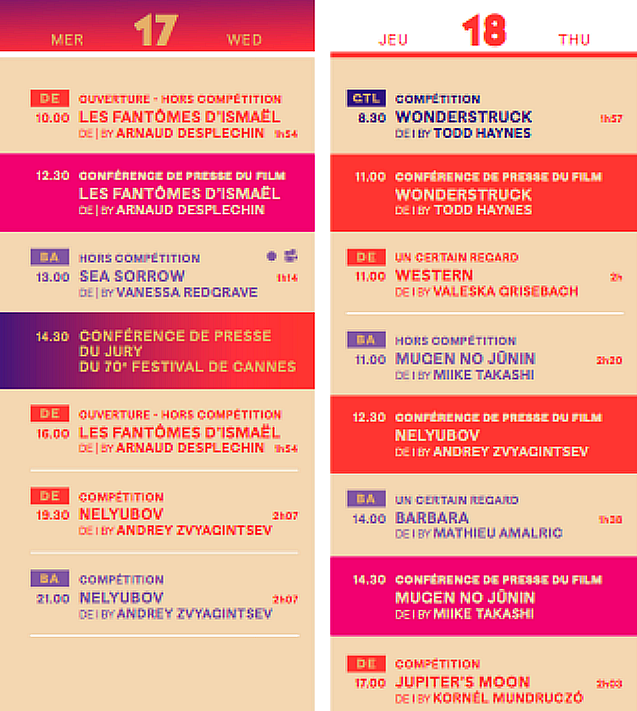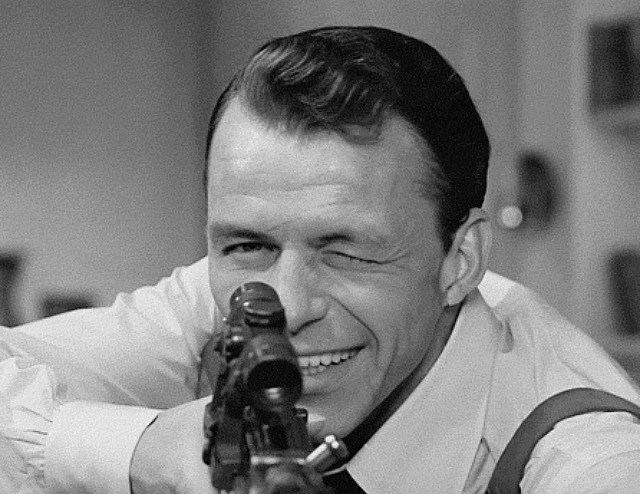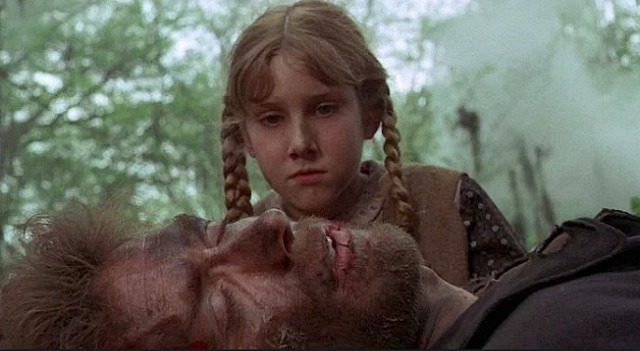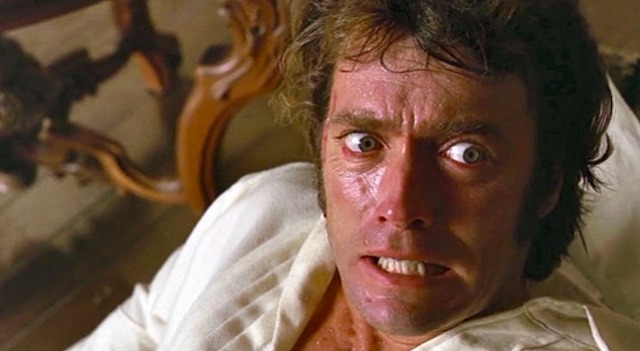We all understand the concept behind fleeting-glimpse teasers. Provide a vague idea of the mood or tone of an upcoming film or TV series without showing any substance. But when you get closer to the release date of a film or cable series, it’s time to man up and give some of that shit up. Slightly longer trailer, a few lines of dialogue, one or two scary snippets, etc. David Lynch‘s Twin Peaks series will debut on Showtime only nine days hence — Sunday, 5.21. And yet the latest teaser (released yesterday) is sticking with the same show-nothing strategy that the initial teaser used last January. This on top of the decision by the Cannes Film Festival to screen the first two episodes four days after the 5.21 debut suggests some degree of trouble. What else am I to think? That it’s the greatest thing since sliced bread but they don’t want to convey this?
Beat That My Heart Skipped
Last January’s downgrading of my Sundance press pass status was a painful experience. Having been granted an Express Pass for the previous five years (’12 through ’16), I was told by media relations guy Jason Berger that I’d have to make do with a general mosh-pit pass. Was Sundance ’17 terrible as a result? Not altogether thanks to HE’s many publicist friends plus my willingness to get in line for Eccles tickets at the Park City Marriott at 8 am, but it hurt all the same.
During my Express Pass years I allowed myself to think perhaps I’d finally made the grade, that all my decades of reporting, filing and reviewing along with the success of Hollywood Elsewhere had led to a plateau of special-tude, and that this plateau was a gesture of respect and whatnot. A kind of badge of honor after decades of hard-fought struggle. Not so much in ’17!
All to say that it felt great a day or two ago when the Cannes Film Festival guys wrote to inform that my good old pink-with-yellow-pastille pass is secure. “You will benefit from a press accreditation for 70th Festival de Cannes,” the letter said. “Its color is white or pink with a yellow dot. This badge allows you exceptional access.” I almost choked up when I read it. Exhale, enjoy your cappuccino, all is well for now.
Michelle Obama to Orange Orangutan: “What Is Wrong With You?”
During a Partnership for a Healthier America q & a in Washington, Michelle Obama sharply addressed Donald Trump‘s recent decision to freeze regulations that would cut sodium and increase whole grains served in school meals.
“Think about why someone is okay with your kids eating crap,” the former First Lady said. “We have a lot more work to do, for sure, but we’ve got to make sure we don’t let anybody take us back because the question is, where are we going back to? This is where you really have to look at motives, you know. You have to stop and think, why don’t you want our kids to have good food at school? What is wrong with you?”
Start Things Off With Bang
Sometimes the Cannes Film Festival will hold its hottest titles until the first weekend or even just after, leaving heat-seekers to bide their time over the first three days. Not this year. The Cannes press schedule just popped, and two major competition titles are screening early — Andrey Zvyagintsev‘s Loveless (aka Nelyubov) at 7:30 pm on Wednesday, 5.17, and Todd Haynes‘ Wonderstruck early the next morning at 8:30 am.

I’ve got seven films at the top of my Cannes list — Loveless, Wonderstruck, Michael Haneke‘s Happy End, Noah Baumbach‘s The Meyerowitz Stories, Alejandro G. Inarritu‘s 390-second virtual reality short Carne y Arena (which rsvp’ed viewers will have to journey on a shuttle to see, apparently some distance from the bunker), those two 56-minute episodes of David Lynch‘s rebooted Twin Peaks series (showing on Thursday, 5.25) and a special screening of Eugene Jarecki‘s Promised Land, which reportedly “juxtaposes contemporary American socio-political history with the biography of Elvis Presley.”
The only bizarre aspect is that Twin Peaks will premiere on Showtime on Sunday, 5.21, or four days earlier than the Cannes showings of the first two episodes. It would obviously mean a lot more to festivalgoers if the Cannes showing was scheduled before the Showtime debut, not after.
Paid My Boxy Dues
I was reading Michael Reubens‘ review of the new Seven Days in May Bluray. But I was soon distracted by Reubens’ 12.5.12 review of a Bluray of Lewis Allen‘s Suddenly, and particularly by the following paragraph:

“There seems to be some confusion regarding the correct aspect ratio of Suddenly. Image’s presentation is an unmasked 35mm frame (with rounded corners) that measures 1.38:1. IMDB lists the film’s original presentation at 1.75:1, which seems unlikely, as that ratio was never a standard in American movie theaters.
“Suddenly was made in the early years of the film industry’s conversion from Academy ratio to its current twin standards of 1.85:1 and 2.39:1. It’s most likely that Suddenly was shot for the older ‘square’ format but protected for the newer matted shape. Certainly most of the shots have sufficient extra headroom to allow the film to be matted to 1.85:1 without damaging the narrative. The images ‘breathe’ better, however, at the full Academy ratio.”
Breathe better?
This isn’t a big deal or even a middle-sized one, but for years I’ve been under the impression that anyone who uses the term “breathing” or “breathing room” in a discussion of aspect ratios is borrowing from the HE glossary. I’m not saying I own the term, but I’ve used it repeatedly in my aspect-ratio articles, and I don’t know of anyone else who has celebrated the concept of breathing room as much as myself.
If “breathe” and “breathing room” were commonly-used terms among Home Theatre Forum aspect-ratio obsessives before Hollywood Elsewhere began in 2004, fine. I stand corrected and no biggie.
Where’s The Rest Of Me?
Last week I settled in with Don Siegel‘s The Beguiled (’71), which I’d seen in portions but never all in one session. This was necessary homework prior to the Cannes Film Festival showing of Sofia Coppola’s remake, which Focus Features will open stateside on 6.23. I’m presuming every Cannes-bound critic has done (or is doing) the same.
Honestly? I didn’t like it all that much. I was mildly intrigued by the perverse tangle of it all (repressed libidos, subtle hostilities, shifting alliances) but I didn’t care about the story or the characters, least of all Clint Eastwood‘s somewhat creepy Union army corporal. He’s mostly focused on which of the seminary women he wants to fool around with, except he’s indecisive or even lackadaisical about it, and after a while I was wondering “what does he want to do, fuck all of them?” Not to mention thoughtless. These women are giving him care and comfort, and all he can think about is Mr. Happy.

The seminary students and their headmistress, played by Geraldine Page, are all eccentric in one way or another, beset by erotic curiosity or stifled longing, but they’re so constricted and corseted that it all turns demented before long, and certainly by the final act. I just didn’t care for their company. After a while I just wanted to get the hell out of there.
Then I began to fantasize about the Union cavalry brigade from John Ford‘s The Horse Soldiers dropping by and saving Eastwood from himself. I wanted to see muddy John Wayne stride into that Confederate mansion and tell Eastwood to snap to attention and report for duty, or at least put him under the care of William Holden‘s Maj. Henry Kendall.
Made In The Shade
HE’s temporary base is on the third floor at 40 rue de Saintonge. The lively Rue de Bretagne, a few meters to the south, is teeming with locals (tourists are apparently forbidden) and full of the usual bars, cafes, bikes, scooters, patisseries, boucheries, clothing shops and an apparently permanent encampment of outdoor stalls selling the usual bric a brac. I guess I could be mistaken for a tourist as I seemed to be the only one taking snaps. But I’m not a tourist and never have been. I’m a traveller, a nomad, a free soul on the prowl.




Lying Stooge
What could it feel like to parrot the Donald Trump talking points, and then be debunked by Trump himself during that Lester Holt interview? Mike Pence will almost certainly go to his grave before revealing his inner thoughts about this latest embarassment, but God, what a pathetic clown. No honor, no clarity, no ethics that stand up to scrutiny. Imagine the inner turbulence as Pence glances at himself in the bathroom mirror. Imagine the stomach acidity.
Le Morte d’Arthur
What killed King Arthur: Legend of the Sword? The widely-shared opinion that it stinks? Medieval genre fatigue? Guy Ritchie‘s attempt to make a tale that has been told again and again into a hodgepodge of flash-bang editing, modern colloquial dialogue, the sounds of Led Zeppelin and a general sense of the absurd? The fact that Charlie Hunnam is no one’s idea of a box-office draw? Or did the trailers turn people off for some other reason?
Did anyone see it? I sure as hell didn’t and wouldn’t.
Reported by Variety‘s Brent Lang: “It looks like summer 2017 has its first official flop. Ritchie’s attempt to make the Knights of the Round Table hip again, is collapsing at the box office. Based on its Thursday pre-shows and Friday afternoon mid-day grosses, the $175 million epic is looking at a disastrous $18 million debut.
“Those projections come from rival studios. Insiders at Warner Bros. think the film could still exceed $20 million, but even if it does, that’s still a very weak start for such an expensive picture. Barring a mid-weekend surge in enthusiasm for tales of gallantry, there will be red ink.”
You and Your Hot Blood
This trailer for Home Again (Open Road, 9.8) looks to me like a suburban sexual fantasy film. More specifically about 40ish Reese Witherspoon, her character recently separated from Michael Sheen, hooking up with some young stuff. The director-writer is Hallie Meyers-Shyer, the daughter of Nancy Meyers (who produced with Erika Olde) and Charles Shyer. The acorn doesn’t fall far from the tree. Costarring Candice Bergen, Michael Sheen, Lake Bell, Nat Wolff, Reid Scott and Pico Alexander.
Total Animal, Chaos Ensues
I’ve just arrived in in a country that recently elected a sensible pragmatist instead of a racist fearmonger to run the show. It feels very good to be here for that fact alone. Would that American bumblefucks had the common sense to realize what they were doing when they voted last November for Orange Orangutan. Yeah, I know — a lot of them didn’t vote for Trump as much as vote against Hillary Clinton, but still.
Donald Trump’s ill-informed, authoritarian, shoot-from-the-hip bluster and bullshit-spewing is a rolling embarassment. The tweets he posted this morning verged on the surreal. Threatening that he may have secretly recorded conversations with recently-dismissed FBI director James Comey, and that “[he’d] better hope that there are no ‘tapes’ of our conversations before he starts leaking to the press“?
Followed by a hypothetical about cancelling live press briefings in favor of issuing written reports? And then doubling down on this notion with Jeanine Pirro in a forthcoming interview on Justice With Judge Jeanine? And admitting in a recent interview with NBC’s Lester Holt that the previous explanations for the Comey firing were evasive, to put it mildly?
It’s exhausting, infuriating. But it also feels good — satisfying — to watch him unravel. I’ve nothing brilliant to offer about any of this, and even if I did I wouldn’t be able to phrase it…I can’t even finish this sentence.. Too jet-lagged. I quit. But it sure feels good to be in a country that primarily values sanity and level-headedness. Leave it at that.



